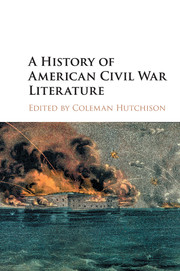Book contents
- Frontmatter
- Dedication
- Contents
- List of Illustrations
- Notes on Contributors
- Preface
- Acknowledgments
- Part I Contexts
- 1 Harriet Beecher Stowe and the “Book That Made This Great War”
- 2 The American Book Trade and the Civil War
- 3 The Transatlantic History of Civil War Literature
- 4 The “American Renaissance” after the American Civil War
- 5 The Realists’ Civil War
- Part II Genres
- Part III Figures
- Recommendations for Further Reading
- Index
2 - The American Book Trade and the Civil War
from Part I - Contexts
Published online by Cambridge University Press: 05 December 2015
- Frontmatter
- Dedication
- Contents
- List of Illustrations
- Notes on Contributors
- Preface
- Acknowledgments
- Part I Contexts
- 1 Harriet Beecher Stowe and the “Book That Made This Great War”
- 2 The American Book Trade and the Civil War
- 3 The Transatlantic History of Civil War Literature
- 4 The “American Renaissance” after the American Civil War
- 5 The Realists’ Civil War
- Part II Genres
- Part III Figures
- Recommendations for Further Reading
- Index
Summary
On 19 February 1866, Putnam & Malone, purveyors of Books, Stationery, Fancy Goods, Etc. at 52 Dauphin St., Mobile, Alabama, sent a check for $97.25 drawn on a New York bank to G. & C. Merriam, publishers of Springfield, Massachusetts, to cover the balance of their account. In a letter accompanying the check, Israel Putnam explained that the firm had been “hard pressed, or would have remitted sooner” and, if desired, “will pay you interest.” In a postscript in which he was writing for his former firm of Brawner & Putnam, booksellers of Eufaula, Alabama, Putnam goes on: “Having sold our house & lot in Eufaula Ala, we propose to send on the money in a short time (as soon as the deed can be made out & the money paid) to settle off our old claims.”
The bookselling firm of Putnam & Malone was newly established in Mobile, but Putnam must have been known to the Merriams from earlier dealings, and the Massachusetts firm had been willing to extend him credit to place their books in the southern market that had been closed to northern publishers during the war. Already the preceding year, Putnam had advertised under “Books Wanted” in the primary book trade journal, published in Philadelphia, for “Publishers’, Booksellers’, Music, and Stationers’ Trade Lists” generally. Although newcomers, Putnam and his partner, James R. Malone, quickly gained a reputation as active and energetic businessmen, worthy of credit. Thanks to insurance, their firm survived being burnt out twice in the first half of 1866, and for several years business was prosperous as, over the years, Putnam changed partners several times. By summer 1870, however, Putnam found himself in financial difficulties, with debts, chiefly to Philadelphia firms, estimated to be $20,000. In September 1870, Putnam left the business and sold his stock for $7,500 to one of his former partners, R. F. Manly, who was also running a bookstore in Tuscaloosa.
The history of Israel Putnam's bookselling enterprise in Mobile is not untypical. It does, however, demonstrate how quickly American publishers, based chiefly in the North, were able to reach out to a southern market that had been unavailable to them while the Union was at war with the Confederacy; furthermore, it raises interesting questions, seldom addressed, about how the Civil War affected the American book trade.
- Type
- Chapter
- Information
- A History of American Civil War Literature , pp. 17 - 32Publisher: Cambridge University PressPrint publication year: 2015

